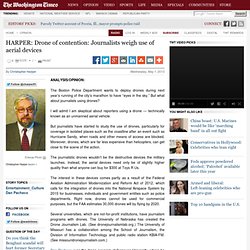

The Scariest Search Engine on the Internet. HARPER: Drone of contention: Journalists weigh use of aerial devices. The Boston Police Department wants to deploy drones during next year’s running of the city’s marathon to have “eyes in the sky.”

But what about journalists using drones? I will admit I am skeptical about reporters using a drone — technically known as an unmanned aerial vehicle. But journalists have started to study the use of drones, particularly for coverage in isolated places such as the coastline after an event such as Hurricane Sandy, when roads and other means of access are blocked. Moreover, drones, which are far less expensive than helicopters, can get close to the scene of the action. The journalistic drones wouldn’t be the destructive devices the military launches. The interest in these devices comes partly as a result of the Federal Aviation Administration Modernization and Reform Act of 2012, which calls for the integration of drones into the National Airspace System by 2015 for businesses, individuals and government entities such as police departments.
So far, Mr. Mr. Mr. PETA plans to spy on hunters with drones. If hunters stalk their prey, how well do you suppose they would like being stalked by a drone that hunts for the hunters?

Hunters may not normally be concerned with surveillance or drones, but PETA plans to launch drones in order to "spy on hunters," collect footage, and then publicize it. Animal rights organization People for the Ethical Treatment of Animals (PETA) announced its intention to use "remote-controlled aircraft to collect and publicize footage of hunters shooting animals and allowing them to escape, only to die slowly and in agony, among other common violations. " The group contacted drone manufacturer Aerobot, and told Fast Company that PETA plans to buy "several Aerobot Cinestar Octocopters--eight-rotored octocopters designed for use by the film industry and landscape architects. The Cinestar is designed to carry heavy cameras and has a 20 minute flight time when carrying smaller cameras; it is also intended for use by a two-person crew.
EFF urges court to protect privacy of text messages. This case represents such an obvious and egregious rights violation by police that I have a hard time granting good faith on the part of the Washington state authorities arguing otherwise.

Background in a nutshell: Police arrest a suspected drug dealer, rummage through the text messages on his phone, respond to one message while pretending to be the suspect, arrange a meeting, and arrest the recipient of the text ... all without a warrant. The state argues - and an appeals court majority agreed - that both suspects had neither a legal expectation of privacy nor Fourth Amendment protection because both considerations evaporate the moment that any text message arrives on any phone. (2013’s 25 Geekiest 25th Anniversaries) You'd be hard-pressed to find anyone who would agree if we are talking about our own phones and our own text messages instead of the phones and text messages of an alleged drug dealer and alleged drug buyer.
From an EFF press release: This Is the Modern Manhunt: The FBI, the Hive Mind and the Boston Bombers. Suspects 2 and 1 together.

Photo: FBI In an earlier era, law enforcement might not have identified the suspects in the Boston Marathon bombing so rapidly. When the smoke literally cleared on Monday, investigators had a huge problem and nearly no leads. No individual or organization claimed responsibility for the bombings that killed three and wounded more than 180. So they took a big leap: They copped to how little they knew, and embraced the wisdom of The Crowd. Hiding in plain sight was an ocean of data, from torrents of photography to cell-tower information to locals’ memories, waiting to be exploited. But the FBI and police have been reluctant to embrace what the hive mind can provide: it implies the authorities don’t always have the answers. As of this writing, police, FBI agents, National Guardsmen and state troopers are still combing the streets of Watertown, trying to find 19-year old University of Massachusetts-Dartmouth student Dzhokhar Tsarnaev. The area was filled with clues. IRS claims it can read your e-mail without a warrant.
The Internal Revenue Service doesn't believe it needs a search warrant to read your e-mail.

Newly disclosed documents prepared by IRS lawyers say that Americans enjoy "generally no privacy" in their e-mail, Facebook chats, Twitter direct messages, and similar online communications -- meaning that they can be perused without obtaining a search warrant signed by a judge. That places the IRS at odds with a growing sentiment among many judges and legislators who believe that Americans' e-mail messages should be protected from warrantless search and seizure. They say e-mail should be protected by the same Fourth Amendment privacy standards that require search warrants for hard drives in someone's home, or a physical letter in a filing cabinet. Nathan Wessler, a staff attorney at the ACLU's Speech, Privacy & Technology Project, said in a blog post that the IRS's view of privacy rights violates the Fourth Amendment: Cyberspace Privacy.